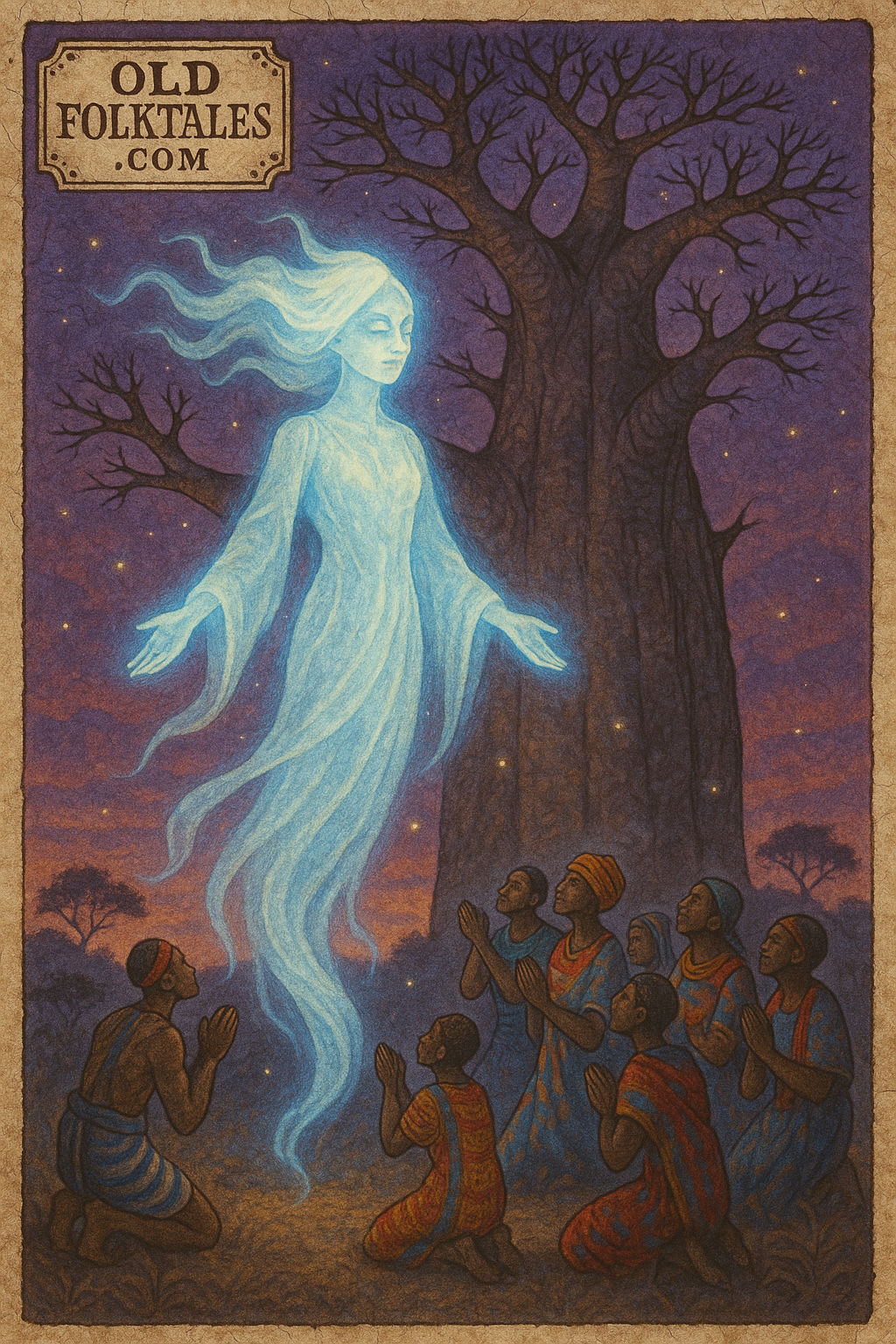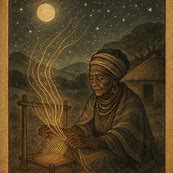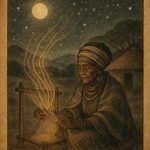In a time long before roads and machines, when the wind carried news from one village to another, there stood a single towering baobab tree in the heart of a small West African village. Its branches stretched like arms into the sky, and its roots gripped the earth with the strength of generations. To the people, this baobab was no ordinary tree. It was believed to hold the spirit of an ancient guardian, a presence older than the oldest elder.
The villagers drew water from the stream at its base, took shade beneath its leaves during the dry season, and whispered their secrets to its bark, knowing that the spirit would keep them safe. In return, the spirit of the baobab blessed the land with fertile soil and gentle rains. For many years, peace and abundance reigned.
But peace has a way of drawing envy. One dry season, a wealthy merchant named Kondo came to the village. He saw the baobab’s vast trunk and thought only of the fine wood he could sell in distant markets. Kondo was not of the village and cared nothing for its traditions. He laughed when the elders told him of the spirit that lived within the tree. “A tree is a tree,” he said, “and this one will make me rich.”
That night, when the moon was a thin silver smile, Kondo crept toward the baobab with his axe. The moment the blade touched the bark, a deep rumble shook the earth. The wind rose like a chorus of angry voices, and a strange mist swirled around him. From within the mist, a tall figure emerged. Her skin was the color of polished wood, her hair a crown of green leaves, and her eyes glowed like embers. She was the spirit of the baobab.
“Kondo,” her voice was neither loud nor soft but filled the air all the same, “do you know the cost of greed?”
Kondo trembled but tried to stand tall. “It is only a tree,” he said.
The spirit’s eyes flashed. “This tree has given shade to the weary, fruit to the hungry, and hope to the hopeless. It has stood through storms and droughts. Without it, this land will wither, and the people will suffer.”
Still, Kondo thought only of his wealth. “I will cut it down,” he insisted.
The spirit sighed, and the ground split beneath him. Roots rose like serpents, wrapping around his ankles. He tried to scream, but his voice was swallowed by the wind. Slowly, he was drawn into the earth until only his cries remained, echoing faintly before fading into silence.
The next morning, the villagers found the merchant’s axe lying at the base of the tree. Where Kondo had stood, there was now a small sapling, its leaves trembling in the breeze. The elders understood. The baobab had claimed him, turning his life into new growth. From that day, they warned all visitors: “The baobab gives life, but it also takes it.”
Seasons passed, and the sapling grew tall beside the great tree, its trunk smooth and young. The people said it was Kondo’s spirit, learning at last the meaning of patience and giving. The baobab continued to bless the land, but the story of Kondo became a lesson told to children: greed blinds the heart, and disrespect for the old ways invites ruin.
Many years later, a great drought came. Other villages lost their crops, but this one endured. The baobab’s roots dug deep, pulling water from hidden springs, feeding the soil and the people. Once again, the villagers gathered beneath its shade, singing songs of thanks to the guardian within. And if you listened closely, some said you could hear two voices in the wind: the gentle wisdom of the spirit and the quiet remorse of Kondo.
Moral Lesson of The Spirit of the Baobab
Respect for nature and tradition is the root of true abundance. The Spirit of the Baobab teaches that when we care for the gifts that sustain life, they will care for us in return. Greed, however, poisons the soul and destroys the harmony that binds people, land, and spirit together.
Knowledge Check
1. What is the main lesson in The Spirit of the Baobab?
The story teaches the importance of respecting nature and traditions while warning against greed and selfishness.
2. Who was Kondo in The Spirit of the Baobab?
Kondo was a wealthy merchant from outside the village who tried to cut down the sacred baobab tree for profit.
3. How did the spirit of the baobab punish Kondo?
The spirit trapped Kondo with roots and transformed him into a young sapling to teach him patience and giving.
4. Why was the baobab important to the villagers?
The baobab provided shade, fruit, fertile soil, and was believed to house a guardian spirit that blessed the land.
5. What happened to the village during the drought in The Spirit of the Baobab?
The village survived because the baobab’s deep roots brought water from hidden springs, keeping the land fertile.
6. How does The Spirit of the Baobab reflect West African oral tradition?
It uses a central natural element with a guardian spirit, moral teaching, and storytelling meant to be passed down through generations.
Cultural Origin: South Africa






